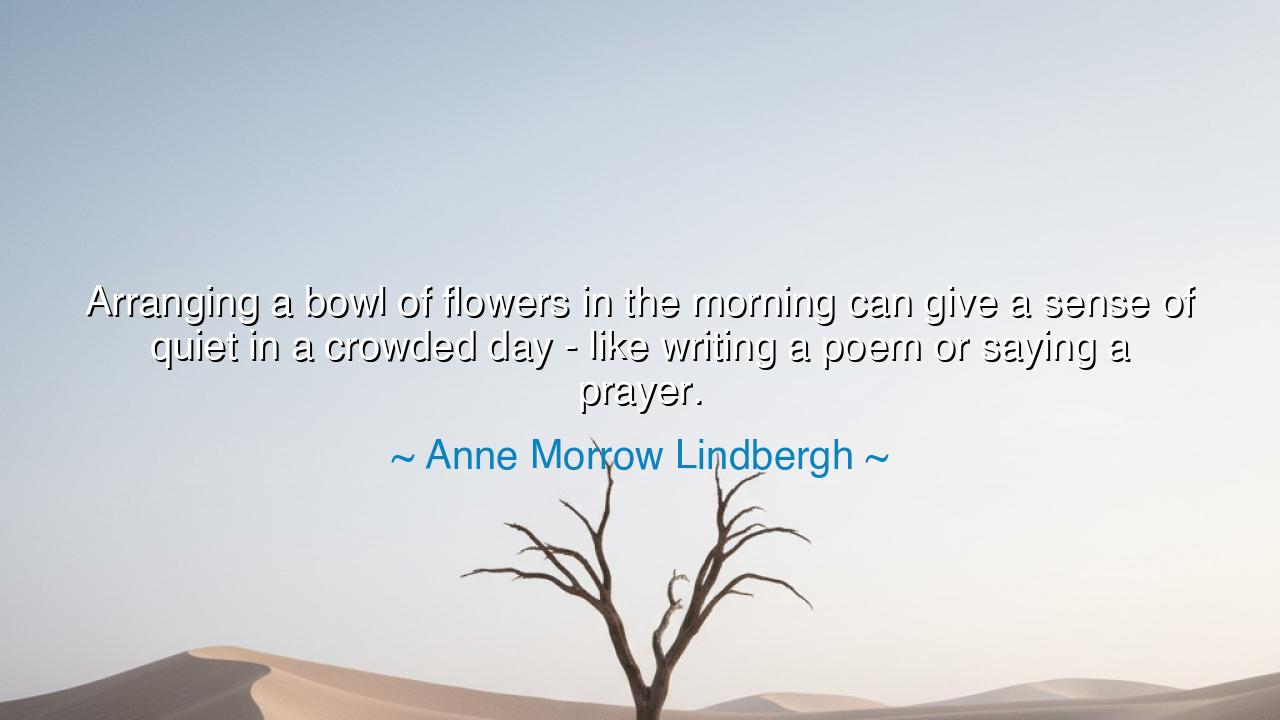
Arranging a bowl of flowers in the morning can give a sense of
Arranging a bowl of flowers in the morning can give a sense of quiet in a crowded day - like writing a poem or saying a prayer.






Anne Morrow Lindbergh, writer, aviator, and seeker of inner stillness, once reflected: “Arranging a bowl of flowers in the morning can give a sense of quiet in a crowded day — like writing a poem or saying a prayer.” These words, delicate yet profound, remind us of the sacred power of small acts. In a world that pulls us constantly into noise and hurry, even the simplest ritual — the placement of blooms in a vessel — can become a sanctuary for the soul.
The act of arranging flowers is no mere ornamentation; it is meditation. Each stem chosen, each petal admired, calls the heart back to presence. Done in the morning, at the threshold of the day, this practice shapes the hours to come, much as a prayer does for the faithful or a poem does for the poet. What Lindbergh reveals is that beauty, when intentionally cultivated, can be a shield against chaos, an anchor in the storm of demands.
This truth has deep roots in history. The Japanese art of ikebana — the disciplined art of flower arranging — has long been revered not simply for its aesthetic, but for its spiritual discipline. To place each blossom with care was to align the inner world with the outer, to discover harmony between man and nature. In monasteries of both East and West, monks tended gardens and arranged flowers for altars, not as distraction, but as devotion. These traditions affirm Lindbergh’s wisdom: small acts of beauty are forms of worship.
The mention of a poem reminds us that art, too, can be born from the ordinary. Just as the poet weaves words into lines that calm or uplift, so does one arranging flowers weave color and fragrance into the air. And the prayer is its twin, for in both, the spirit lifts itself beyond the self, touching something eternal. To compare flower arranging to these sacred gestures is to restore dignity to the simple, to remind us that not all holiness requires temples — sometimes it requires only a bowl, a blossom, and a quiet heart.
Consider the life of Anne Morrow Lindbergh herself. Amid the fame and turbulence surrounding her husband, aviator Charles Lindbergh, she sought spaces of silence to preserve her identity and peace. Her writings, especially in Gift from the Sea, speak often of the need to carve out solitude and beauty in the midst of modern demands. This quote flows from that same well: it is the cry of one who knew the crowdedness of life and yet discovered that even the smallest ritual could restore balance to the soul.
The lesson is luminous: never despise small acts of stillness. Do not wait for great retreats or long pilgrimages to find peace. A bowl of flowers, a line of poetry, a whispered prayer — these are gateways to serenity. To embrace them daily is to weave quiet into the fabric of life, to remind the spirit that even in the busiest day, beauty can be chosen.
Practical action follows naturally: tomorrow, rise and create something simple. Arrange flowers on your table, write a single verse, or bow your head in a brief prayer. These acts do not delay your day; they sanctify it. They remind you that life is not measured only in tasks accomplished, but in moments of presence lived.
Thus, Anne Morrow Lindbergh’s words endure as a gentle commandment: make space for quiet beauty in the morning, and the day will unfold with more grace. Children of tomorrow, remember this: life will crowd you, the world will clamor for your time, but if you begin with flowers, with poetry, with prayer, then your heart will carry stillness even into the busiest hours.






AAdministratorAdministrator
Welcome, honored guests. Please leave a comment, we will respond soon